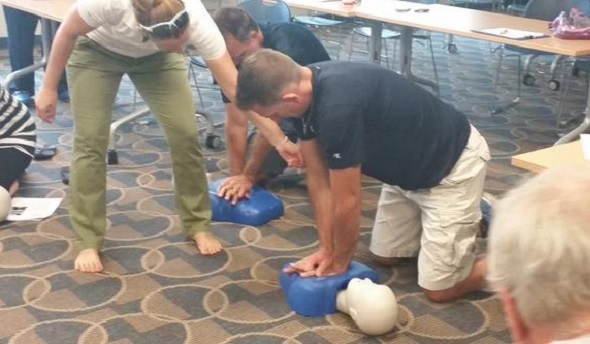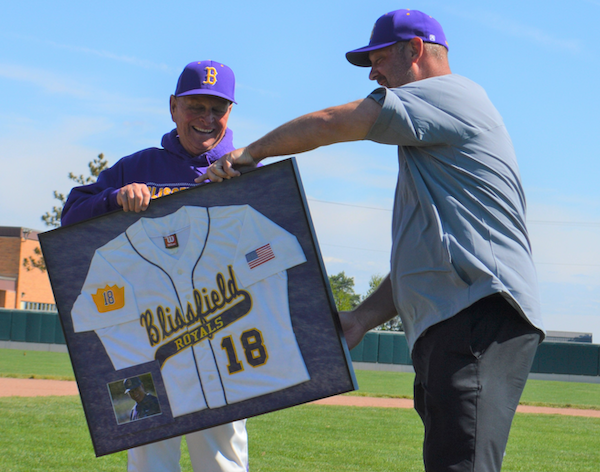
CPR Training, CAP Add to Preparedness
By
Geoff Kimmerly
MHSAA.com senior editor
October 12, 2015
A recent graduate from Ovid-Elsie High School named Chris Fowler started classes this fall at Michigan State University, his days representing the Marauders on the basketball court, football field and golf course now memories as he starts the next chapter of his young adult life.
But his story also will remain a reminder as his high school’s athletic department prepares each year to keep its athletes as safe as possible.
Three years ago next month, Fowler collapsed on the football practice field in cardiac arrest. The then-sophomore was brought back to life by two of his coaches, who revived him with CPR and an AED machine.
There’s no need for athletic director Soni Latz to recount the events of that day when explaining the importance of being ready to respond to a medical crisis – her coaches are well aware of why Fowler survived and understand completely why they too must be prepared.
“Everyone is very aware of what happened and the importance of being trained and knowing what to do, and actually feeling comfortable to step in and administer CPR when needed,” Latz said. “You can feel it’s never going to happen to you, but once it has, it makes you more aware and conscientious to be prepared.”
But Fowler’s story is worth noting on a larger level as varsity coaches at all MHSAA member schools are required this year for the first time to become certified in CPR, and as the largest classes in Coaches Advancement Program history begin course work that includes up to four modules designed to make them aware of health and safety situations that may arise at their schools as well.
The CPR requirement is the most recent addition to an MHSAA thrust toward raising expectations for coaches’ preparedness. The first action of this effort required all assistant and subvarsity coaches at the high school level to complete the same rules and risk minimization meeting requirement as high school varsity head coaches beginning with the 2014-15 school year.
The next action, following the CPR mandate, will require all persons hired as a high school varsity head coach for the first time at an MHSAA member school after July 31, 2016, to have completed the MHSAA’s Coaches Advancement Program Level 1 or Level 2.
In addition, MHSAA member schools this summer received the “Anyone can Save a Life” program, an emergency action plan curriculum designed by the Minnesota State High School League to help teams – guided by their coaches – create procedures for working together during medical emergencies.
“Coaches get asked to do a lot, and even if a school has an athletic trainer or some other health care professional, that person can’t be everywhere all the time. Coaches often are called upon to be prepared for (medical) situations,” said Gayle Thompson, an adjunct assistant professor at Albion College who formerly directed the athletic training program at Western Michigan University and continues to teach CAP sports medicine modules.
“The more (coaches) can learn to handle the situations that can inevitably arise, the better off they’re going to feel in those situations and the better care they’ll be able to offer their athletes. It’s proven that the faster athletes are able to get care, the quicker they’re able to come back to play.”
 Pontiac Notre Dame Prep – which has sent a number of coaches through the CAP program – began a focus on heart safety about five years ago after a student-athlete was diagnosed with a heart issue that allowed her to continue to play volleyball and softball, but not basketball. Athletic director Betty Wroubel said that prior to the student’s diagnosis, the school did provide training in CPR, AED use and artificial respiration; however, that situation put coaches and administrators further on the alert.
Pontiac Notre Dame Prep – which has sent a number of coaches through the CAP program – began a focus on heart safety about five years ago after a student-athlete was diagnosed with a heart issue that allowed her to continue to play volleyball and softball, but not basketball. Athletic director Betty Wroubel said that prior to the student’s diagnosis, the school did provide training in CPR, AED use and artificial respiration; however, that situation put coaches and administrators further on the alert.
Her school offers CPR training also to subvarsity and middle school coaches, using a combination of video instruction from the American Red Cross and in-person guidance by members of the school community who are certified to teach those skills. Students at the school also have received training – and it paid off a few years ago when one of them gave CPR to a baby who had stopped breathing at a local shopping mall.
Portage Central scheduled two sessions this fall for its coaches to receive not only CPR certification, but AED training as well. Central was fortunate to have an American Red Cross first-aid trainer in house, teacher Rachel Flachs, who also is close to the athletic side as the girls swimming and diving coach at Mattawan High School.
Central athletic director Joe Wallace said the training was offered not just to varsity head coaches, but every head coach on every level of the program so that “at least we know that at every given practice, every game, we’d have someone recently trained,” he said.
And he was proud of how his coaches immersed themselves in the subject matter.
“They were putting themselves in scenarios to see how it related to their own sports and asking really great questions,” Wallace said. “It was thought provoking.”
The CAP sports medicine modules are designed to do the same as coaches consider the medical situations they could face. They aren’t designed as “medical training,” said Tony Moreno, a professor of kinesiology at Eastern Michigan University and teacher of all four CAP sports medicine modules. Rather, attendees receive an awareness and basic education on common injuries, injury mechanisms and prevention, and how to create an action plan in the event of an injury incident.
The CAP program touches on a variety of safety topics in several of the available seven levels of coach education.
CAP 1 – which is part of the mandate for new coaches beginning next school year – includes “Sports Medicine and First Aid.” Cap 4 has modules titled “Understanding Athlete Development” and “Strength and Conditioning: Designing Your Program.” CAP 5 includes the session, “Peak Health and Performance.” Attendees also have the option of receiving CPR and AED training as an addition to some courses.
With a quick Internet search, coaches have no trouble finding a variety of resources on sports medicine, performance enhancement, nutrition and healthy living regarding young athletes. “However, some of these sources are more credible and scientifically-based in comparison to others,” Moreno said. “CAP strives on an annual basis to continue to update and improve the quality and credibility of this information and in a face-to-face manner where coaches have the opportunity to ask questions about their experiences and specific programs.”
“Having the CAP requirement will only make them better informed. Many have had this kind of information before, but there’s always something new coming,” Thompson added. “I think we do a good job, not of trying to tell them they were wrong, but maybe taking what they’ve known a step further and making them better prepared – empowering them to do their best.”
Wroubel may understand more than most athletic directors the growing list of tasks coaches are asked to accomplish; she’s also one of the winningest volleyball and softball coaches in MHSAA history and continues to guide both Fighting Irish programs.
But she and Wallace both said the CPR mandate isn’t considered another box to check on a to-do list; there’s enthusiasm because of its importance and the opportunity to carry those skills into other areas of community life as well.
Wroubel has served as a coach since 1975 and said this renewed emphasis on coaches having knowledge of sports medicine actually is a return to how things were when she started. Back then, coaches were responsible for being that first line of medical know-how, from taping ankles to providing ice and evaluating when their athletes should make a trip to the doctor’s office.
“When I first started coaching, we didn’t have sports medicine people, trainers, or team doctors other than for football. You did everything yourself,” Wroubel said. “I think everybody got away from that, but I think it’s coming back because a trainer can’t be everywhere.
“It’s healthy and it’s good for kids. … The more of us with emergency skills, the better we’re able to serve our community.”
PHOTOS: (Top) Portage Central coaches receive CPR training earlier this fall. (Middle) Pontiac Notre Dame Prep coaches practice during AED training. (Photos courtesy of school athletic departments.)

Baseball Remains Front of Tuttle's Mind, Close to Retired Coach's Heart
By
Doug Donnelly
Special for MHSAA.com
June 29, 2023
BLISSFIELD – Larry Tuttle jogged out of Tuttle Dugout onto the artificial turf at Adrian College and took his spot in the third base coach’s box, looked in at the batter as he approached the plate and clapped his hands.
It’s like he never left.
For more than 50 years, Tuttle occupied the third base coach’s box for the Blissfield Royals. He is the winningest high school baseball coach in Michigan history and one of the winningest prep baseball coaches in America. It’s been two years since Tuttle last coached the Royals, but when the Lenawee County All-Star Game came around this year, and Onsted coach Matthew Randall was named a head coach of one of the teams, one of his first calls was to Tuttle.
“To see him coach third base again for two innings of that all-star game was nothing short of amazing,” Randall said. “I love that man and everything he has taught me.”
Tuttle and Randall faced off about 40 times over the years.
“There’s a lot of respect between us,” Tuttle said. “I was happy to do it.”
Tuttle, 79, is a Morenci native who played baseball and graduated from Adrian College, coached for one year at Temperance Bedford and five decades at Blissfield. He spends a little more than half of the year in Florida these days in a house he owns in The Villages, a retirement community about an hour north of Orlando.
This past spring, Blissfield took a spring baseball trip to Florida and Tuttle was able to come out to the field and watch a few practices.
“That’s the best time,” he said. “I always enjoyed those first practices of each season. People will ask me, ‘But what about the cold? It’s always so cold in Michigan that first week.’ The first 10 days or two weeks or so inside, that’s where we formed our whole season, working on the fundaments and the strategy, getting the kids mentally ready for the season. That was a fun part of coaching.”
He returns home to Michigan each summer to spend time with his kids and grandchildren, including a freshman-aged granddaughter who is showing good things in softball. His roots are in southeast Michigan, and he has every intention of keeping it that way.
 Tuttle’s career at Blissfield was nothing short of remarkable.
Tuttle’s career at Blissfield was nothing short of remarkable.
He coached Blissfield for 54 seasons. It would have been 55, but the 2020 season was canceled due to COVID. The Royals won 1,332 games during his career. They won 33 District titles, 23 Regional championships and seven Finals crowns. Blissfield also won 40 league titles, including in his final season of 2021. His No. 18 jersey was retired by the school district.
In 2015, Tuttle was an easy inaugural choice for the Michigan Baseball Hall of Fame.
This summer, Tuttle returned to Michigan in time to see Blissfield play a few regular-season games and was there when his beloved Royals played in the Division 3 District tournament. He wore his familiar Royals gear. When the Lenawee County All-Star game was played, Tuttle was in his full Blissfield uniform. It still fits perfectly.
“I still enjoy the game,” Tuttle said. “It’s my energy level that just isn’t what it used to be. That’s why I stepped down. I still love the strategy of the game.”
When he’s watching a game, he still goes through every play in his mind and what he would do if he was calling the shots.
“You’re always coaching even though you might a spectator,” he said. “It may not be the right way, but it’s my way. That’s baseball. I love thinking about what to do on this count or that count, to take a pitch or not.
“I see a lot of coaches these days who had played in college. Young coaches coach the college way, but you are dealing with high school kids who may not have a real firm understanding of the game itself. You have to teach high school baseball to college kids. You don’t teach college or pro ball to high school kids.”
Tuttle, who has battled some health issues the last couple of years, misses being in his role as coach.
“I miss the players and the relationships I had with umpires and the other coaches,” he said. “It’s hard to replace that.”
Tuttle is an icon in Lenawee County. When he goes to a game, people gather around him to talk. He still follows the area teams and has a relationship with several coaches and ex-players.
Tuttle enjoyed monumental success at Blissfield. The Royals’ last sub-.500 season was in 1971.
“I know that because I have the records,” Tuttle said. “The closest we came was we were 8-8 one year in the 1980s.”
Tuttle has been a stickler for stats his entire career. Some coaches have a hard time remembering how their team did two years ago. Tuttle knows. He kept intricate stats on every team he’s coached at Blissfield and to this day has them organized only a few steps away from his kitchen table at his home in Blissfield – which is just across the street from the high school and a long home run away from the baseball field that is named in his honor.
“I have a file cabinet full of files from each season and I have the scorebook from every year I coached at Blissfield, starting in 1968,” Tuttle said. “Stats were always important to me, not the wins, but the stats. Baseball stats tell you so much about the game.”
Since stepping aside, Tuttle has had time to reflect on his career.
“I would have never believed I would have coached that long,” Tuttle said. “Then, I sit back and think, ‘That was a lot of wins, wasn’t it?’ I don’t mean that in a bragging way. I think more about it when I go to a game.”
Randall recently announced his retirement from Onsted after 13 years as head coach. Onsted is in the same conference as Blissfield, the Lenawee County Athletic Association, so he had a close-up view of Tuttle in action.
He now has a memory of the last game he coached at the All-Star Game at Adrian College.
“I credit a lot of my coaching philosophy to this day to him,” Randall said. “Our relationship has really grown over the years. I wanted Coach Tuttle to be with me in my final game. That’s why I asked him.”
PHOTOS (Top) Retired Blissfield baseball coach Larry Tuttle coaches third base during the June 26 Lenawee County All-Star Game. (Middle) Tuttle’s jersey is retired during a 2021 ceremony. (Photos by Doug Donnelly.)

